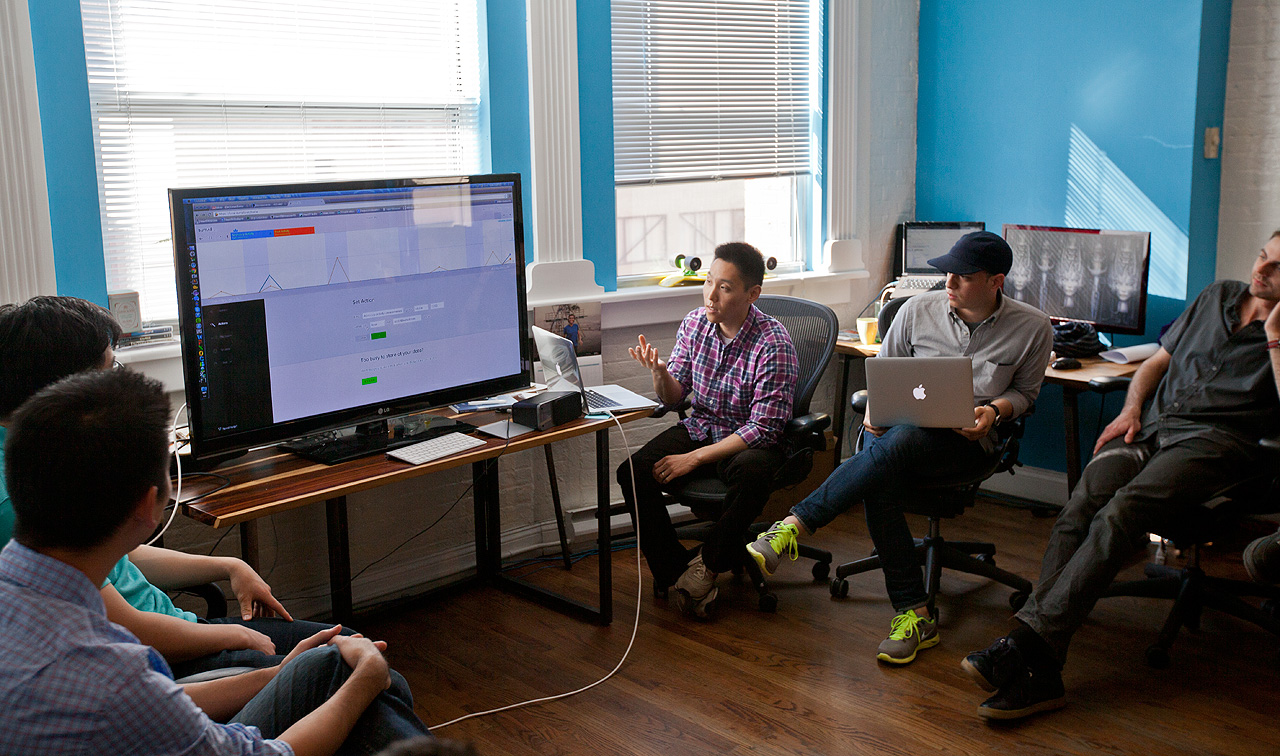Hosting A Hackathon
Will Vanderhoef is an engineer at SumAll primarily working on new ways to gather and visualize data to make it more useful for users.
He’s also the creator of our internal hackathons so we picked his brain on what hackathons are, why they’re important, and why your company should start hosting them.
For people who have no idea what hackathons are, can you describe the structure of it?
A hackathon is an event held within a finite amount of time for engineers and creatives to get together and design, build, and demo a new feature or product – anything that went from nothing to something in that discrete period of time. The entire process from idea creation to execution is almost like a micro-startup timescale.
What initially attracted you to participating in hackathons?
I’ve been to public hackathons where people from the outside come in and write code with certain rules in place. I’ve gone to a couple at some startups and one or two at Fortune 500 companies. Generally the game plan is to get outside developers to use their APIs or product in some way that they haven’t thought of themselves or wouldn’t budget time to do so. You’re basically coming in and working for free for what could potentially be a day or two worth of work that might win you an iPad.
So it’s mostly for their benefit?
Throwing a hackathon with external resources coming in and volunteering to work on something is often a recruiting strategy. External developers will come in because they’re looking for glory or to mess around with a new technology they haven’t used before. When you participate in a hackathon it’s a discrete block of time that you can dedicate to something and then not think about anymore. That’s a rare thing you get to do, especially as an engineer.
It also benefits you because you could be going to a hackathon for the purpose of trying to land a job, general networking, or promoting something of your own.
Do you know any other companies that hold internal hackathons?
I know Foursquare has done them in the past and it seems like the engineers get really excited for it. They’re given time, resources, caffeine, alcohol – everything they need to get stuff done for a day. Everyone supports them wholeheartedly; it completely opens the door to creativity, which is awesome especially when you’re working on projects for so long you start feeling creatively stifled.
Is part of the reason to hold hackathons to boost company morale?
That certainly helps, if we don’t burn ourselves out in the process of working through one. The first hackathon we did at SumAll, we definitely overworked ourselves for the rest of the week so that was rough. We did it over a single night with presentations held the following morning so everyone literally stayed up that night and burnt themselves out.
Being the organizer of the SumAll hackathons, can you talk about the guidelines?
We’ve done it a number of different ways so far. We’ve tried to evolve so it’s a little less stressful and more transparent in terms of the rules and how it was going to operate because the first one had a lot of rough edges. It has also helped that the majority of people have gone through a couple of these and there’s now a better sense of how the hackathon operates. There’s less effort on my shoulders to get running and organized and give instructions to people. Everybody knows they’re gonna get upwards of 48 hours of actual work time for a prize and the project better be well thought out and have some sort of impact on us because we’re aiming to try to actually build things that are out of the box but still benefit the company in some way.
Hackathon Project Ideas
Can you give more examples of what has been created at one of our own hackathons?
The one that comes to mind is stream sharing. Stream sharing is the ability for one SumAll user to invite another user to view their data. This has the potential to really push the usefulness of the data we’ve ingested out to our users.
I’ve seen projects that are slightly more esoteric; one group made a a chalkboard box and stuck a ticker tape in it to count off the number of sign ups we received daily. As long as it’s innovative and is created within the defined time period, it’s anything is fair game.
Hackathons aren’t limited solely to engineers either. Our marketing team created a video that skewered the day-to-day life at SumAll that ended up winning one of our hackathons.
Why do you think it’s important for companies to hold internal hackathons?
The sheer amount of useful, crazy work we get out of everyone in such a short period of time is vastly more productive than at any other point in time. It’s competitive in nature and engineers are somewhat competitive by their own nature, which makes for highly creative output. A lot of the projects that start as hackathon ideas turn into real world products. The idea of building something out that might actually be worthy of its own startup in general is quite possible as a result of hackathons.
Editor’s note: This story originally appeared on SumAll’s blog.






